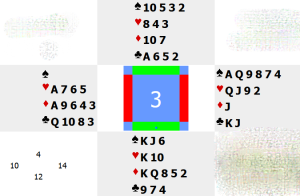
1♦ by South (better minor), Pass, 1♠ by North, Double by East (not alerted), Re-double by South, Pass, Pass, Pass. East comments before opening lead “Let’s see how this goes”.
Contract three-off for East/West 1000. Heavy spade suit holding by East now obvious. Questioned as to why there had been no alert for the double, says ” It was for take-out and I was looking for the best contract our way.”
Any rectification available here?
Neville Richards – Llandrindod Wells
Interesting situation, and the full answer somewhat depends upon the standard of player.
Firstly East has mis-bid in terms of the normal meaning of a double in this situation. It is usually played as purely take-out (and if not should be alerted). Nothing wrong in East’s action – he is entitled to mis-bid his hand. What is wrong is West’s subsequent action. He should assume it to be a genuine t.o double, and should probably bid 3/4 hearts (or cue bid spades). The intervention of South’s re-double doesn’t really affect the matter. The fact that West has not bid hearts strongly suggests that he has ‘fielded’ partner’s double (probably not with mal-intent towards the opposition, just that he ‘knows’ that partner may have this sort of hand). If a less experienced pair, this is probably a situation of East’s double just showing opening values (substantiated by East’s subsequent comment – many less experienced players in our club would do that) – but nevertheless the opposition are entitled to know that.
The Law was changed a couple of years ago, in that if a player fields a mis-bid, this should be treated as a mis-explanation situation. I think North/South have been damaged by the ‘incomplete’ explanation (not automatically so, but in this case probably ‘yes’), so firstly the re-double should be removed.
But what then? West may argue that if South hadn’t re-doubled he would ‘obviously’ have bid 3/4 hearts. But surely the re-double makes it more imperative that he should bid hearts – North/South may have ten spades between them. Maybe he was confused by the re-double !! (thought it was rescue – in which case North would have alerted).
So with the re-double removed, -500 is a good sacrifice against East/West’s vulnerable heart game. But it may be that East/West wouldn’t reach 4♥, or maybe they wouldn’t make ten tricks (a less experienced player may attempt to draw three rounds of trumps before establishing the clubs).
If directing, without giving West too much time for thought, I would first ask West exactly what he would do if South doesn’t re-double (maybe he could convince the Director that he might still ‘pass’). Hence the dependency on the standard of player. If declaring the Director should ask how it should be played (West in hearts, otherwise East in hearts if West says he would cue-bid spades). I would note what, and how, West replied, and if there was no definite answer, I would then award a weighted adjusted score (some percentages of NS -500, -140, -170, -620, +100 based on the perceived abilty of East/West). Note, in the weighting you cannot include the -1000 actual board score.
East’s ‘Let see how it goes’, gives me the impression of a gung-ho attitude to the game – don’t care about these silly rules – but this is unfair to the opponents, so they should be treated accordingly.
Tony Haworth